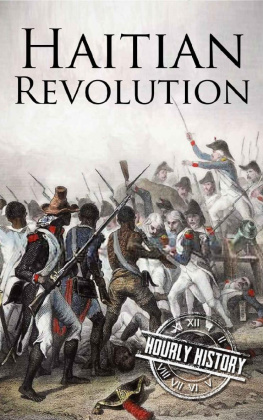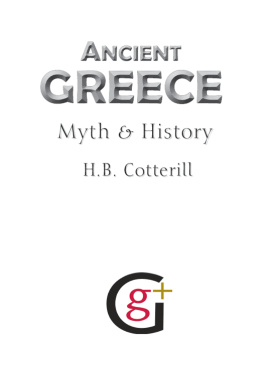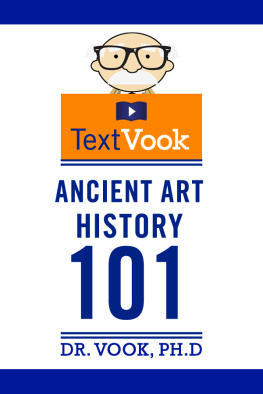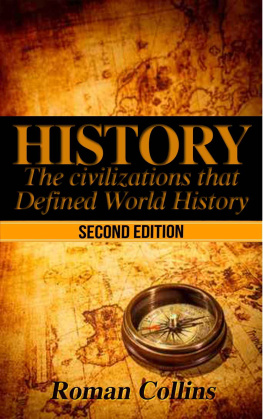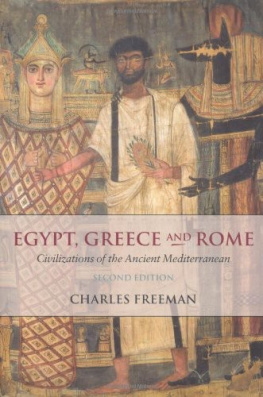Hourly History - Ancient Greece: A History From Beginning to End (Ancient Civilizations Book 3)
Here you can read online Hourly History - Ancient Greece: A History From Beginning to End (Ancient Civilizations Book 3) full text of the book (entire story) in english for free. Download pdf and epub, get meaning, cover and reviews about this ebook. year: 2017, publisher: Hourly History, genre: Religion. Description of the work, (preface) as well as reviews are available. Best literature library LitArk.com created for fans of good reading and offers a wide selection of genres:
Romance novel
Science fiction
Adventure
Detective
Science
History
Home and family
Prose
Art
Politics
Computer
Non-fiction
Religion
Business
Children
Humor
Choose a favorite category and find really read worthwhile books. Enjoy immersion in the world of imagination, feel the emotions of the characters or learn something new for yourself, make an fascinating discovery.

- Book:Ancient Greece: A History From Beginning to End (Ancient Civilizations Book 3)
- Author:
- Publisher:Hourly History
- Genre:
- Year:2017
- Rating:5 / 5
- Favourites:Add to favourites
- Your mark:
- 100
- 1
- 2
- 3
- 4
- 5
Ancient Greece: A History From Beginning to End (Ancient Civilizations Book 3): summary, description and annotation
We offer to read an annotation, description, summary or preface (depends on what the author of the book "Ancient Greece: A History From Beginning to End (Ancient Civilizations Book 3)" wrote himself). If you haven't found the necessary information about the book — write in the comments, we will try to find it.
Hourly History: author's other books
Who wrote Ancient Greece: A History From Beginning to End (Ancient Civilizations Book 3)? Find out the surname, the name of the author of the book and a list of all author's works by series.
Ancient Greece: A History From Beginning to End (Ancient Civilizations Book 3) — read online for free the complete book (whole text) full work
Below is the text of the book, divided by pages. System saving the place of the last page read, allows you to conveniently read the book "Ancient Greece: A History From Beginning to End (Ancient Civilizations Book 3)" online for free, without having to search again every time where you left off. Put a bookmark, and you can go to the page where you finished reading at any time.
Font size:
Interval:
Bookmark:
Copyright 2017 by Hourly History.
All rights reserved.
In August of 2016, a runner carried a torch into a newly built stadium amidst great celebration. The flame, which had been set alight four months and thirty-eight thousand kilometers previously, started out in Olympia, Greece and relayed runner to runner through thousands of honorary torchbearers until it reached its destination. The torch was passed to a waiting official, and the ceremonial cauldron was lit with the flame. The arrival of the torch marked the beginning of the thirty-first modern Olympic Games in Rio de Janeiro.
The torch, and the spirit of the Olympics are based on a celebration of athleticism that began thousands of years ago in Greece. The games were a sacred festival. Ongoing wars were halted in honor of the games so that all athletes and all nations were able to participate. Class was not a factor in the games. No matter the athletes social status, all male athletes were able to compete. However, this moment of equality was fleeting and was certainly not complete. Women were not permitted to partake in the contests, and married women were not even allowed into the stadium.
The games were celebrated to honor the Greek gods, who lived on Mount Olympus, and particularly the king of the gods, Zeus. The first documented occurrence of the games that we know about took place in 775 BCE, in Olympia, Greece. These first games consisted of only one event, a footrace. More contests were added that celebrated the arts of hunting and war; wrestling, javelin throws and chariot racing. When the Olympic Games were resurrected in modern times in 1896, new sports were added, and a tradition of moving the location of the games began. This was also the occasion for the first Olympic marathon. Since then, the Olympics have taken place all around the world; including recent celebrations in London, Seoul, Tokyo, Sydney, and Beijing.
As grand and inspiring as they are, the Olympic Games are only one example of the influence of ancient Greece on our culture today. Greek tradition has been leading the way in politics, philosophy, art, literature, and science. The torch has been passed to a new global society, and the flame burns as brightly as ever.
The perfect panoramic view of the ancient Olympic festivities in Olympia, Greece, was imagined to be had from Mount Olympus, towering nearby. The Greeks believed that Mount Olympus was the home of the gods, so it was fitting they have the best seats at the games held in their honor.
Mount Olympus is the highest point in Greece, rising 2917 meters from sea level. Several cities were built at its base during ancient times, and these locations are being excavated today. Archaeological evidence shows that the sites were in use for thousands of years, both by Greeks and Romans.
Zeus was the ruler of these Olympian gods. He was a sky god with the power of lightning at his command. The group of gods who called the mountain their home were known as the Olympians. The group included Zeus wife and sister, Hera. She was the goddess of married women and childbirth, and continuously enraged by Zeus fascination with mortal women. Zeus brother Poseidon was the god of the sea. His children also shared the mountain home. Ares was the brash and bloody god of war. Apollo, god of the sun and also of music was the twin brother of Artemis, goddess of the woodlands and the hunt. Demeter was the mother goddess of grain and agriculture. Athena, who was said to be bornfully grown and armoredfrom her father Zeus head, was the goddess of war and knowledge. Aphrodite was the goddess of love and beauty, who would figure strongly in the stories of mortal men. Aphrodite was unhappily married to Hephaestus, god of the forge and master craftsman to the gods. Hermes was the messenger god who flew on winged sandals to do the bidding of the gods on Earth. Hestia was the goddess of hearth and home with sacred fires burning in her temples. Dionysus was the wild god of the vine, wine, and debauchery whose festivals might be as insanely dangerous as they were pleasurable. Hades was the solemn god of the dead, gray ruler of the underworld.
The Greek vision of the afterlife saw a dark river barring the crossing of lost souls. The place of punishment for the evil spirits was known as Tartarus. One spirit in Tartarus was said to have been set the task of rolling a large boulder to the top of a hill. At the end of his strenuous effort, as success seems within reach, the rock tumbles inexorably back to the base of the hill. Another tortured soul must endure constant thirst and hunger while standing in water and surrounded by grape vines, both of which are just beyond his desperate grasp. Lessons in futility harshly taught by gods as flawed as their worshippers.
The joyful world for deserving spirits was known as the Elysian Fields, a land of endless summer and plenty. Persephone was the beautiful daughter of Demeter whom Hades kidnapped and forced to be his bride and Queen of the dead. Persephone had her own dual nature. While she resided in hell she was Queen of the dead, and her mothers grief causes the plants in the fields to wither and die, and the days to grow short and dark. However, when she returned to the world above, she was the joyful spirit of spring and life again returning to the earth.
The Greek gods greatly influenced Western civilization. The Romans adopted the Olympians wholesale, giving them Roman names and building Roman temples for their worship. The culture of the Renaissance held ancient deities in the highest regard, and the rebirth of knowledge brought many of the tales of the gods to popular audiences. The Greek gods brought a deep level of anthropomorphism to their spiritual beliefs. The gods seemed to act out of anger, jealousy, love, or sorrow, and in the same unpredictable manner as humans do.
Tales from Greek mythology may seem strangely familiar. To anyone with the common phobia involving fear of spiders, the story of a proud young girl may hold special meaning. Arachne bragged about her weaving skill, saying her talent rivaled that of Athena, goddess of crafting. As punishment, the girl was transformed into a spider, doomed to forever weave her web. It is from this story that the arachnid class takes its name.
Another story from the mythology of the ancient Greeks was the tale of the Minotaur and the labyrinth. The Minotaur was a terrible creature, half man, and half bull. King Minos had the labyrinth built by Daedalus, a legendary inventor, in order to hide the Minotaur from view. The monster fed on the youths who were sacrificed to it. The Athenian hero, Theseus was eventually able to solve the riddle of the labyrinth with help from Princess Ariadne. He was then able to find and kill the Minotaur. The Palace of Knossos in Crete was identified by archaeologist Arthur Evans as the site of the mythic labyrinth because of its complex architecture. The Minoan culture has been associated with this legend ever since. It has also been suggested that the Minoan civilization may have been the inspiration for the legends of the lost city of Atlantis. This theory hinges on a volcanic eruption that occurred in ancient times that destroyed the island of Santorini, opposite Crete in the Mediterranean. It appears a massive tidal wave caused extensive damage to the coast at some point in the past.
The stories that have been passed to us from the Greeks continue to intrigue and surprise historians. Interpretations of old documents shed light on the relations of these stories and the reality of the ancient world. One aspect of the Grecian religious life that remains mysterious to us today was even known as a mystery cult. Historians believe that a cult like the one of the Eleusinian Mysteries revealed a belief in an afterlife and granted initiates the knowledge to reach it. There is some evidence that the mystery cult object that was presented as the symbol of eternal life would have been represented by an ear of corn. What the actual message of these cults was, and how the mystery affected the ancient Greek worshippers may never be known.
Font size:
Interval:
Bookmark:
Similar books «Ancient Greece: A History From Beginning to End (Ancient Civilizations Book 3)»
Look at similar books to Ancient Greece: A History From Beginning to End (Ancient Civilizations Book 3). We have selected literature similar in name and meaning in the hope of providing readers with more options to find new, interesting, not yet read works.
Discussion, reviews of the book Ancient Greece: A History From Beginning to End (Ancient Civilizations Book 3) and just readers' own opinions. Leave your comments, write what you think about the work, its meaning or the main characters. Specify what exactly you liked and what you didn't like, and why you think so.








